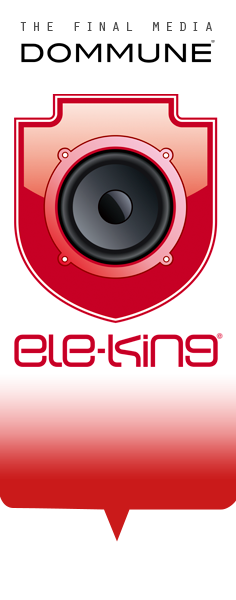MOST READ
- interview with xiexie オルタナティヴ・ロック・バンド、xiexie(シエシエ)が実現する夢物語
- Chip Wickham ──UKジャズ・シーンを支えるひとり、チップ・ウィッカムの日本独自企画盤が登場
- Natalie Beridze - Of Which One Knows | ナタリー・ベリツェ
- 『アンビエントへ、レアグルーヴからの回答』
- interview with Martin Terefe (London Brew) 『ビッチェズ・ブリュー』50周年を祝福するセッション | シャバカ・ハッチングス、ヌバイア・ガルシアら12名による白熱の再解釈
- VINYL GOES AROUND PRESSING ──国内4か所目となるアナログ・レコード・プレス工場が本格稼働、受注・生産を開始
- Loula Yorke - speak, thou vast and venerable head / Loula Yorke - Volta | ルーラ・ヨーク
- interview with Chip Wickham いかにも英国的なモダン・ジャズの労作 | サックス/フルート奏者チップ・ウィッカム、インタヴュー
- interview with salute ハウス・ミュージックはどんどん大きくなる | サルート、インタヴュー
- Kim Gordon and YoshimiO Duo ──キム・ゴードンとYoshimiOによるデュオ・ライヴが実現、山本精一も出演
- Actress - Statik | アクトレス
- Cornelius 30th Anniversary Set - @東京ガーデンシアター
- 小山田米呂
- R.I.P. Damo Suzuki 追悼:ダモ鈴木
- Black Decelerant - Reflections Vol 2: Black Decelerant | ブラック・ディセレラント
- Columns ♯7:雨降りだから(プリンスと)Pファンクでも勉強しよう
- Columns 6月のジャズ Jazz in June 2024
- Terry Riley ——テリー・ライリーの名作「In C」、誕生60年を迎え15年ぶりに演奏
- Mighty Ryeders ──レアグルーヴ史に名高いマイティ・ライダース、オリジナル7インチの発売を記念したTシャツが登場
- Adrian Sherwood presents Dub Sessions 2024 いつまでも見れると思うな、御大ホレス・アンディと偉大なるクリエイション・レベル、エイドリアン・シャーウッドが集結するダブの最強ナイト
Home > Reviews > Album Reviews > L’Rain- I Killed Your Dog

ブルックリン育ちのミュージシャン兼キュレーターのロレインことタジャ・チークは、3作のアルバムを通じて、彼女が「approaching songness(歌らしさへの接近)」と呼ぶ領域間で稼働してきた。その音楽は、記憶と連想のパリンプセスト[昔が偲ばれる重ね書きされた羊皮紙の写本]で、人生のさまざまな局面で作曲された歌詞とメロディーの断片が、胸を打つものから滑稽なものまで、幅広いフィールド・レコーディングと交互に織り込まれている。それはつねに変化し、さまざまな角度からその姿を現す。ニュー・アルバム『I Killed Your Dog』の “Our Funeral” の冒頭の数行で、チークはオートチューンで声を歪ませて屈折させ、息継ぎの度に変容させていく。焦らそうとしているわけではなく、一節の中に複数のヴァージョンの彼女自身を投影させるスペースを作り出そうとしているのだ。高い評価を得た2021年のアルバム『Fatigue』のオープニング・トラックは、「変わるために、あなたは何をした?」との問いかけではじまっている。ロレインは確かな進化を遂げながら、その一方でチークは、これまでの作品において、一貫性のある声を保っているのだ。ループするギター、狂った拍子記号、糖蜜のようににじみ出る、心を乱すようなドラムスなど、2017年の自身の名を冠したデビュー盤でみられた音響的な特徴は、『I Killed Your Dog』でも健在だ。同時にロレインは、これまでよりも人とのコラボレーションを前面に打ち出している。今回は、彼女とキャリアの初期から組んできたプロデューサーのアンドリュー・ラピンと、マルチ・インストゥルメンタリストのベン・チャポトー=カッツの両者が、彼女自身と共にプロデューサーとしてクレジットされているのだ。チークが過去の形式を打ち破ることを示すもっとも明白なシグナルは、気味が悪くて注意を引く今作のアルバム・タイトルに表れている。『I Killed Your Dog』の発売が発表された際のピッチフォークのインタヴューでは、これは彼女の「基本的にビッチな」アルバムであり、リスナーの期待を裏切り、意図的に不意打ちを食らわせるものだと語っている。また他のインタヴューでは、最近、厳しい真実を仕舞っておくための器としてユーモアを利用するピエロに嵌っていることに言及している。これは、感傷的なギターとピッチを変えたヴォーカルによる “I Hate My Best Friends(私は自分の親友たちが大嫌い)” という1分の長さの曲にも表れている。(念のため、実際には彼女は犬好きである。)
メディアは、ロレインの音楽がいかにカテゴライズされにくいかということを頻繁に取り上げている。だが、チークが黒人女性であり、予期せぬ場で存在感を発揮していることから、これがどの程度当たっているのかはわからない。その点では、彼女には他のジャンル・フルイド(流動性の高い)なスローソン・マローン1(『Fatigue』にも貢献した)、イヴ・トゥモア、ガイカやディーン・ブラントなどの黒人アーティストたちとの共通点がある。「You didn’t think this would come out of me(私からこれが出てくるとは思わなかったでしょ)」と、彼女は “5to 8 Hours a Day (WWwaG)” で、パンダ・ベアを思わせるような、幾重にも重ねられたハーモニーで歌っている(「この歌詞の一行は間違いなく、業界へ向けた直接的な声明だ」と彼女はClash Musicでのインタヴューで認めている)。
『I Hate Your Dog』 では、チークがこれまででもっともあからさまにロックに影響された音楽がフィーチャーされているが、彼女のこのジャンルとの関係性は複雑なものだ。最初に聴いたときに、私がテーム・インパラを思い浮かべた “Pet Rock” について、アルバムのプレス・リリースにはこう書かれている──2000年代初期のザ・ストロークスのサウンドと、若い頃のロレインが聴いたことのなかったLCDサウンドシステム──これには、一本とられた。
彼女の初期のアルバムと同じくシーケンス(反復進行)は完璧で、各トラックを個別に聴くことで、その技巧を堪能することができる。これは、トラックリストに散りばめられたスキットやミニチュアに顕著で、アルバムのシームレスな流れに押し流されてしまいがちだ。33秒間という長さの “Monsoon of Regret” は、微かな焦らしが入ったような、混沌とした曲であり、“Sometimes” は、アラン・ローマックスがミシシッピ州立刑務所にループ・ペダルをこっそり忍び込ませたかのような曲だ。
“Knead Be” がアルバム『Fatigue』の言葉のないヴォーカルとローファイなキーボードによる1分間のインタールードで、ヴィンテージなボーズ・オブ・カナダのようにワープし、不規則に揺れる “Need Be” をベースにしている曲だと気付くには、注意深く聴き込む必要がある。この曲でチークは、そのトラックに沈んでいたメロディーの一節を、小さい頃の自分に、物事がうまくいくことを悟らせる肯定的な賛歌へと拡大した。ただ、その言葉(「小さなタジャ、前に進め。あなたは大丈夫だから」)はミックスの奥深くに潜んでいるため、歌詞カードを見ないと、何と歌っているのか判別するのが難しい。
初期の “Blame Me” のような曲では、チークはひとつのフレーズのまわりを、まるでメロディーの断片が頭の中に引っかかってリピートされているかのようにグルグルと旋回する。『I Killed Your Dog』では、何度かデイヴィッド・ボウイの “Be My Wife” のようなやり方で、一度歌詞を最後まで通したかと思うと、またそれを繰り返して歌う。あらためて聴き返すと、彼女が足を骨折した後に書いたバラード調の “Clumsy(ぎこちない・不器用)” ほどではないが、歌詞は、その歌詞に出てくる問いかけ自体に回答しているかのように聴こえる。“Clumsy” では曲の最後に、冒頭で投げかけた問いへと戻る。「想像もつかないような形で裏切られたとき、(自分が足をついている)地面をどのように信頼しろというの?」
彼女はまだ、答を探り続けているのかもしれない。
終曲の “New Years’ UnResolution” は、チークがアルバムを「アンチ・ブレークアップ(別れに反対する)」レコードと表現したことを端的に表している。この曲でも、歌詞がループとなって繰り返されるが、今回はその繰り返しの中で、歌詞が大きく変えられているのだ。彼女はその言葉には、別れた直後と、かなりたってから、後知恵を働かせて書いたものがあると説明している。バレアリックなDJセットで、宇多田ヒカルの “Somewhere Near Marseilles -マルセイユ辺り-” と並べても違和感のない、ダブ風のキラキラと揺れる光のようなグルーヴに乗せて、チークは、陰と陽のような、互いを補いあう2つのヴァースを生み出している。
ひとりでいるのがどんな感じか忘れてしまった
雨を吐いて 雪を吐き出す。
日々は、ただ古くなっていく
何も持たないということがどんなものか知っている?
どんなものかは知らないけれど
あなたは今夜ここに来る?
私から電話するべきか あるいは無視するべき? 私は……する
恋をするということがどんな感じか忘れてしまった
太陽を飲み込んで 雪を吐き出す
日々は、古くはならない。
何かを持っているということがどんなことか知っている?
ふたりともそれを知っている。
ただ真っ直ぐに私の目を見て
あなたから私に電話するべきか あるいは私を無視するべき? あなたは……する
彼女はいまや、人生を両側から眺めることができたのだ。
L’Rain - I Killed Your Dog
written by James Hadfield
Across three albums, L’Rain – the alias of Brooklyn-raised musician and curator Taja Cheek – has operated in an interzone that she calls “approaching songness.” Her music is a palimpsest of memories and associations, interleaving fragments of lyrics and melodies composed at different points in her life, with field recordings that range from poignant to hilarious. It’s constantly shifting, revealing itself from different angles. During the opening lines of “Our Funeral,” from new album “I Killed Your Dog,” Cheek contorts and refracts her voice with AutoTune, morphing with each breath she takes. It isn’t that she’s playing hard to get, more that she’s making space for multiple versions of herself within a single stanza.
“What have you done to change?” asked the opening track of her widely acclaimed 2021 album “Fatigue.” L’Rain has certainly evolved, but Cheek has maintained a consistent voice throughout her work to date. Many of the sonic signatures from her self-titled 2017 debut – looping guitar figures, off-kilter time signatures, phased drums that ooze like treacle – are still very much present on “I Killed Your Dog.” At the same time, L’Rain has become a more collaborative undertaking: She’s quick to credit the contributions of producer Andrew Lappin – who’s been with her since the start – and multi-instrumentalist Ben Chapoteau-Katz, both of whom share producer credits with her this time around.
The most obvious signal that Cheek is breaking with past form on her latest release is in the album’s lurid, attention-grabbing title. As she told Pitchfork in an interview when “I Killed Your Dog” was first announced, this is her “basic bitch” album, pushing back against expectations and deliberately wrong-footing her listeners. She’s spoken in interviews about a recent fascination with clowns, who use humour as a vessel for hard truths. In this case, that includes a minute-long song of gooey guitar and pitch-shifted vocals entitled “I Hate My Best Friends.” (For the record, she loves dogs.)
Media coverage frequently notes how resistant L’Rain’s music is to categorising, though it’s hard to say how much this is because Cheek is a Black woman operating in spaces where her presence wasn’t expected. In that respect, she has something in common with other genre-fluid Black artists such as Slauson Malone 1 (who contributed to “Fatigue”), Yves Tumor, GAIKA and Dean Blunt. “You didn’t think this would come out of me,” she sings on “5 to 8 Hours a Day (WWwaG),” in stacked harmonies reminiscent of Panda Bear. (“That line is definitely a direct address to the industry,” she confirmed, in an interview with Clash Music.)
“I Hate Your Dog” features some of Cheek’s most overtly rock-influenced music to date, although her relationship with the genre is complicated. According to the press notes for the album, “Pet Rock” – which made me think of Tame Impala the first time I heard it – references “that early 00’s sound of The Strokes and LCD Soundsystem that L’Rain never listened to in her youth.” Touché.
Like her earlier albums, the sequencing is immaculate, and it’s worth listening to each track in isolation to appreciate the craft. That’s especially true of the skits and miniatures scattered throughout the track list, which can get swept away in the album’s seamless flow. The 33-second “Monsoon of Regret” is a tantalising wisp of inchoate song, reminiscent of Satomimagae; “Sometimes” is like if Alan Lomax had snuck a loop pedal into Mississippi State Penitentiary.
It takes close listening to realise that “Knead Be” is based on “Need Be” from “Fatigue,” a one-minute interlude of wordless vocals and lo-fi keyboards that warped and fluttered like vintage Boards of Canada. Here, Cheek takes the wisp of melody submerged within that track and expands it into a hymn of affirmation, in which she lets her younger self know that things are going to work out – though her words of encouragement (“Go ’head lil Taja you’re okay”) lurk so deep in the mix, you’d need to look at the lyric sheet to know exactly what she’s singing.
On earlier songs such as “Blame Me,” Cheek would circle around a single phrase, like having a fragment of a melody stuck in your head on repeat. Several times during “I Killed Your Dog,” she runs through all of a song’s lyrics once and then repeats them, in the manner of David Bowie’s “Be My Wife.” Heard again, the words sound like a comment on themselves – no more so than on the ballad-like “Clumsy” (written after she broke her foot), when she returns at the end of the song to the question posed at its start: “How do you trust the ground when it betrays you in ways you didn’t think imaginable?” It’s like she’s still grasping for an answer.
Closing track “New Year’s UnResolution” – which best encapsulates Cheek’s description of the album as an “anti-break-up” record – also loops back on itself, except this time the lyrics are significantly altered in the repetition. She’s explained that the words were written at different points in time, both in the immediate aftermath of a break-up and much later, with the earned wisdom of hindsight. Over a shimmering, dub-inflected groove that wouldn’t sound out of place alongside Hikaru Utada’s “Somewhere Near Marseilles” in a Balearic DJ set, Cheek delivers two verses that complement each other like yin and yang:
I’ve forgotten what it’s like to be alone
Vomit rain spit out snow.
Days, they just get old.
Do you know what it’s like to have nothing?
I don’t know what it’s like.
Will you be here tonight?
Should I call you or should I ignore you? I will...
I’ve forgotten what it’s like to be in love
Swallow sun spit out snow
Days, they don’t get old.
Do you know what it’s like to have something?
We both know what it’s like.
Just look me in the eye.
Should you call me or should you ignore me? You will...
She’s looked at life from both sides now.
ジェイムズ・ハッドフィールド
ALBUM REVIEWS
- Loula Yorke - speak, thou vast and venerable head/ Loula Yorke - Volta
- Actress - Statik
- Black Decelerant - Reflections Vol 2: Black Decelerant
- High Llamas - Hey Panda
- The Stalin - Fish Inn - 40th Anniversary Edition -
- KRM & KMRU - Disconnect
- Cornelius - Ethereal Essence
- Kronos Quartet & Friends Meet Sun Ra - Outer Spaceways Incorporated
- Martha Skye Murphy - Um
- Mouchoir Étanche - Le Jazz Homme
- Taylor Deupree - Sti.ll
- John Cale - POPtical Illusion
- Amen Dunes - Death Jokes
- A. G. Cook - Britpop
- James Hoff - Shadows Lifted from Invisible Hands


 DOMMUNE
DOMMUNE
